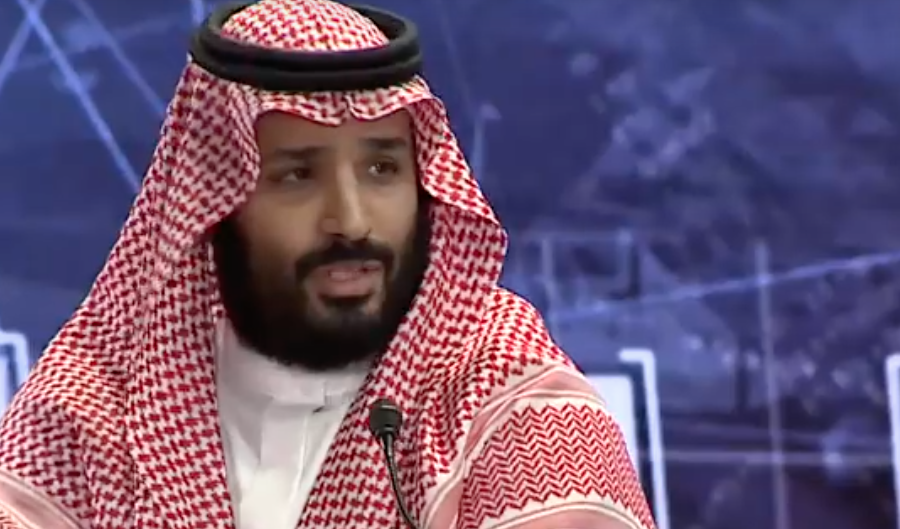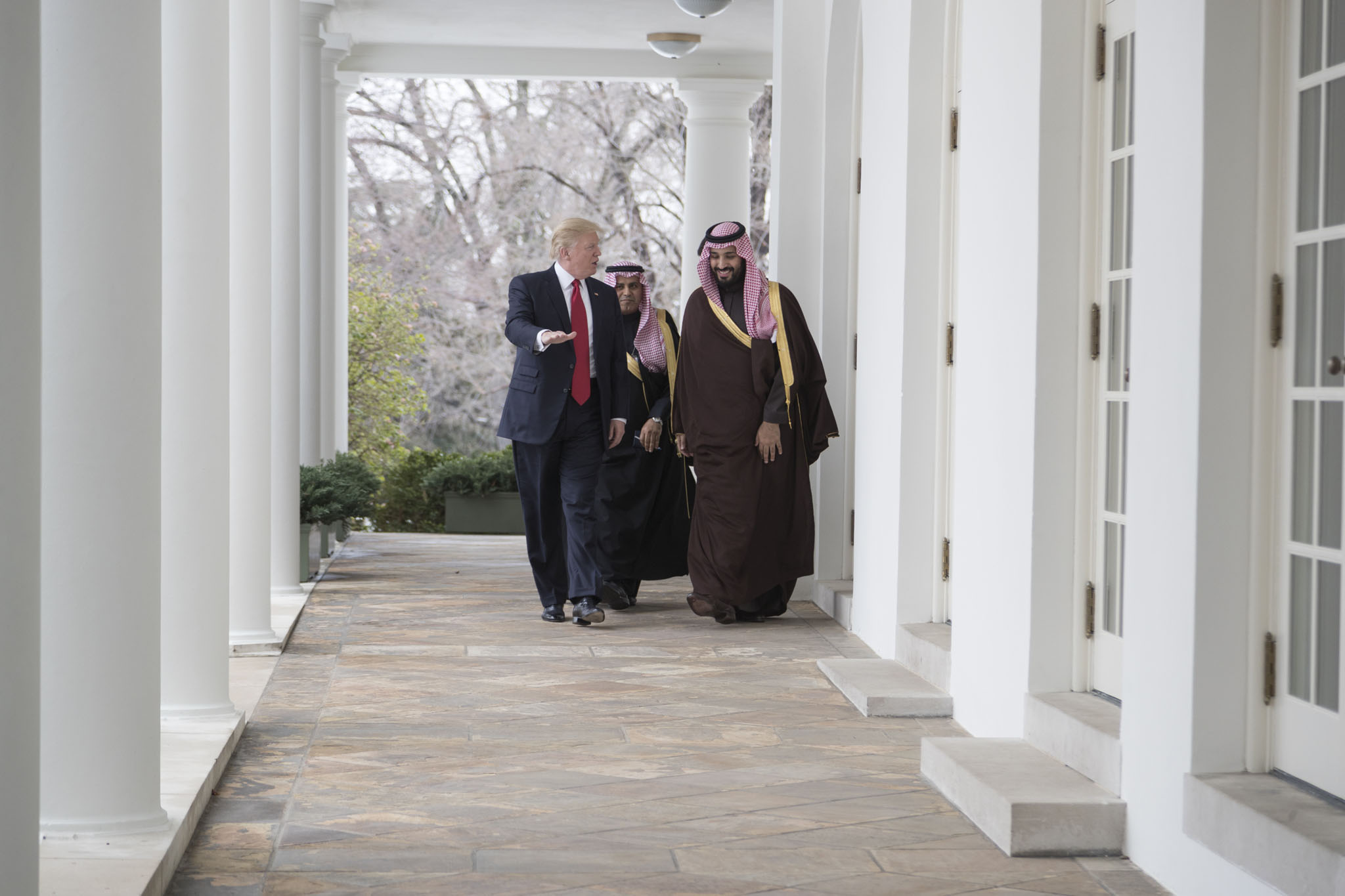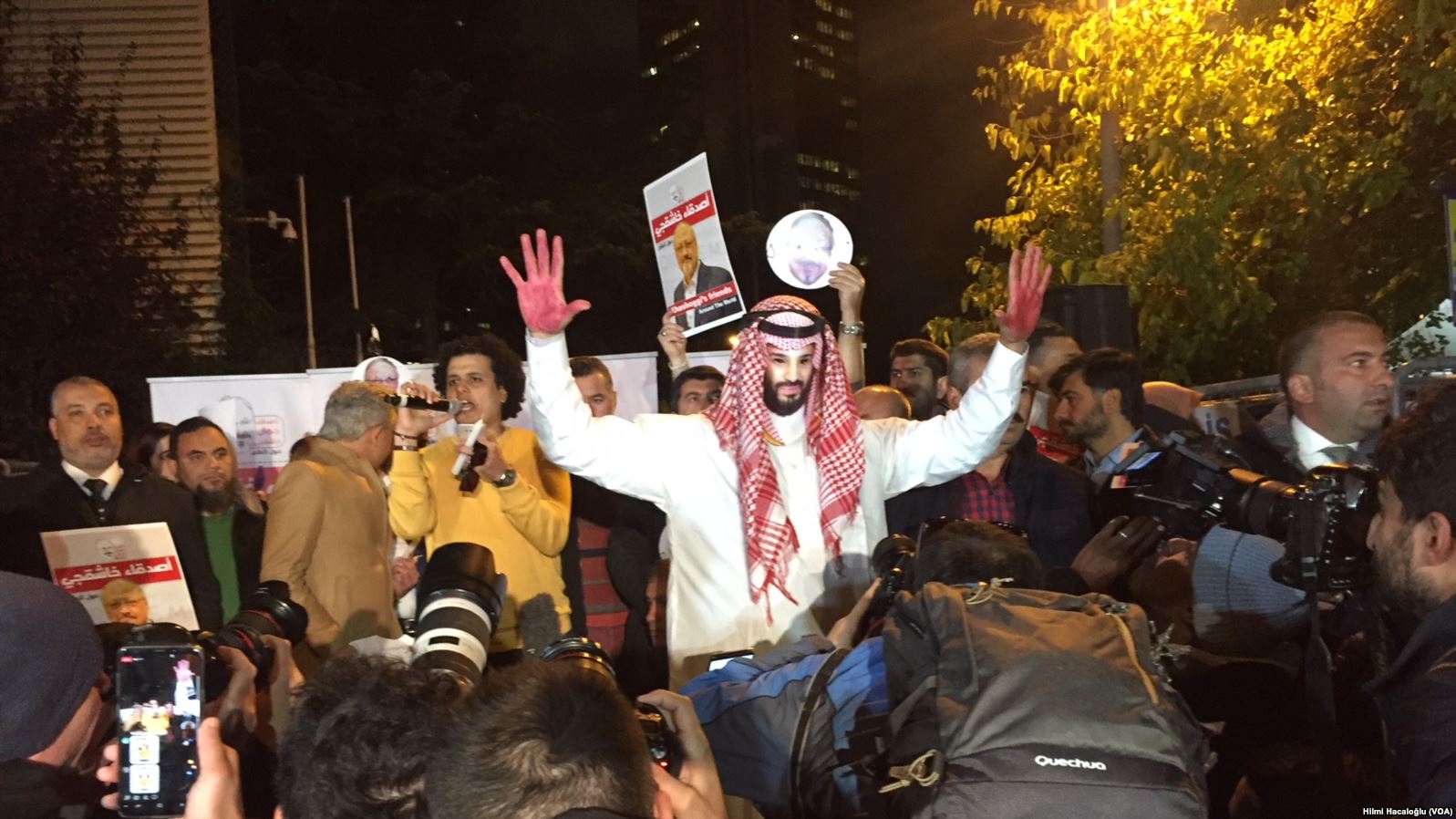From launching a war on Yemen to having Jamal Khashoggi murdered, As’ad AbuKhalil sizes up the magnitude of MbS’s miscalculations.
By As`ad AbuKhalil
Special to Consortium News
 All is not well with the Saudi regime. Despite amassing more power than any previous Saudi ruler, with the possible exception of founding King `Abdul-`Aziz (known in the U.S. as Ibn Saud), Crown Prince Muhammad bin Salman, or MbS, has not been able to deliver on any of his political and economic promises.
All is not well with the Saudi regime. Despite amassing more power than any previous Saudi ruler, with the possible exception of founding King `Abdul-`Aziz (known in the U.S. as Ibn Saud), Crown Prince Muhammad bin Salman, or MbS, has not been able to deliver on any of his political and economic promises.
MbS offered the Saudi people a bargain: that he would achieve military, political and economic successes while imposing brutal repression at home.
He also offered a modicum of social relaxation, probably at the behest of Western PR firms that have influence with Gulf regimes. But these social reforms have been neither consistent nor smooth. Women were permitted to drive but the feminist men and women who advocated rights for women were jailed and tortured. (The easing of social restrictions was presumably meant to be popular, but it’s hazardous to measure public opinion in Saudi Arabia: Western media’s “conversations-on-the-street” don’t really say much because this is a government that imposes long prison sentences for the wrong retweet.)

Saudi Crown Prince Muhammad bin Salman in 2018. (YouTube)
Power Grabber
MbS began seizing power when his ailing father took over as king in 2015. He then became minister of defense. The post had long been held by his uncle, Prince Sultan, and it was widely expected that Sultan would be succeeded by his son, Khalid Bin Sultan (the figure-head deputy commander of the Desert Storm war). But MbS disregarded customary succession and the balance of power among the various royal factions, including his better-educated and more-experienced half-brothers.
In 2017, when he promoted himself to crown prince from deputy crown prince, he became the sole undisputed leader of Saudi Arabia. To consolidate his economic and military control, he weakened the National Guard, the vehicle for tribal alliances in the kingdom.
As soon as MbS became defense minister, he launched the war on Yemen. He calculated that the war would only last a few weeks and that the Huthis would quickly surrender. (The Obama administration presumably found this credible, since it lent support to the adventure, probably as a compensation for the U.S.-Iran agreement, which the Saudis vigorously opposed.)
Epic Huthi Resistance
But the war has dragged on and the Huthis have proven a formidable military force. Their resistance to the brutal military campaign by Gulf and Western countries is nothing short of epic. And, while the war was launched in the name of weakening Iranian hold in the region, it has actually cemented ties between the Huthis and the Iranian regime and its allies in the region.
This calculation backfired on other fronts as well. The assault on Yemen brought international media scrutiny to his atrocious war crimes there, while repressions inside the kingdom have been exposed in the wake of the horrific killing and dismemberment of Jamal Khashoggi.

President Donald Trump with MbS in March 2017. (White House/Shealah Craighead)
MbS assumed that his excellent relations with the Trump administration, and with the other Western governments, would be sufficient to shield his regime from criticism. But Turkey — which has its own feud with the Saudis, largely due to Ankara’s alliance with Qatar and the Muslim Brotherhood, and its good relations with Iran — released embarrassing details about the complicity of the MbS government in the murder of Khashoggi in the consulate in Istanbul. Turkey left no doubt that MbS was the mastermind of the murder, and the CIA seems to agree, according to U.S. media.
Khashoggi’s slaying became a permanent stigma for MbS. With the exception of his brief appearance at the G-7 summit in France a few weeks ago, he has not visited the U.S. or the West since.
Confronting Iran
MbS’s miscalculations have extended to his entire confrontation with Iran in the region. Last year he kidnapped the prime minister of Lebanon, Saad Hariri (who has been a loyal Saudi client) to punish him for not going far enough in confronting Hizbullah. After subjecting him to beatings and humiliation, he forced him to read on a Saudi TV station a resignation letter prepared for him. But as soon as Hariri was released due to Western pressures, he returned to Lebanon and rescinded his resignation.
Furthermore, MbS was hoping — along with MbZ of the United Arab Emirates [Mohammed bin Zayed, crown prince of Abu Dhabi] — that Donald Trump would be the U.S. president they had been waiting for: the one who would launch a devastating war on Iran to end Teheran’s influence in the Middle East once and for all.
In the first few years of the Trump administration Saudi regime media were full of scathing attacks on former President Barack Obama, going so far as to suggest that he was a secret Shiite Muslim who harbored religio-political sympathy for Iran. That same press was filled with glowing profiles of Trump and praise for his impending military campaign against Iran. (This was during Trump’s famous twitter threats against Iran and North Korea.) But Trump has proven more cautious about military adventures than either of his immediate predecessors. Once the Saudi regime media picked up on those signals, criticism of the Trump administration surfaced.
Change of Mind
MbS seems to have now changed his mind about the desirability of war with Iran. What Iran has done in recent months (assuming it was responsible for the various attacks on shipping in the Gulf and on the oil installations in Saudi Arabia), is to demonstrate to Saudi Arabia and the UAE not only the reach of its bombing capability, but its determination to extend the war to the Arab Gulf countries if Iran is attacked by Israel or the U.S. This can explain the recent Saudi and Emirati overtures to the Iranian regime. Both are suddenly expressing concern over the cost of war, if it were to erupt in their region.

Istanbul protesters outside Consulate General of Saudi Arabia following the murder of Khashoggi. (Hilmi Hacaloglu, VOA via Wikimedia Commons)
MbS must not be a happy man. He wanted the war on Yemen to become his signature victory and cement his reputation domestically and regionally. But it has served the opposite purpose.
His 2017 blockade of Qatar has not gone well either. Qatar managed to survive economically and its impending regional isolation did not materialize either, as it worked to improve its relations with the unlikely odd mix of Turkey, Iran and the U.S.
Finally, MbS hoped Israeli Prime Minister Benjamin Netanyahu would be able to elevate his stature in Washington. But the latter has proven unable or unwilling to intervene on Capitol Hill to lower the tone of criticism aimed at MbS. Furthermore, Netanyahu is today the least popular Israeli prime minster in Congress, perhaps since 1948, because he has associated his fortunes so closely with the Republican Party, and with a president detested by Democrats. Netanyahu has been dealing with his own personal scandal, and the recent election didn’t guarantee him his premiership. In other words, MbS can’t count on Netanyahu.
Limited Choices
Bin Salman’s economic promises have also failed to bear fruit for the Saudi population. He may now be facing rising resentment within the royal family itself, although he’s so far managed to deal with that ruthlessly in the last two years.
MbS has limited choices. He can’t afford to antagonize Trump and nor can he influence Trump one way or another regarding U.S. policies toward Iran.
His best hope is that war does not take place, and that Khashoggi will be forgotten. That is very unlikely given the recent publicity surrounding the first anniversary of the killing. A man who made arrogance a key part of his personality, has been humiliated by Khashoggi, a former member of the Saudi royal entourage.
But then again, Western governments have short memories when it comes to war crimes, assassinations and human rights violations by despots who are loyal to Western agendas. Any rehabilitation that MbS can work out will require him to sacrifice much of his original agenda. It will mean curtailing his appetite for war in Yemen and elsewhere and to drop his plans to confront Iran on all fronts. The recent crippling of oil installations responsible for more than 50 percent of Saudi oil production had the effect of also crippling the foreign policy agenda of Mohammed bin Salman.
As’ad AbuKhalil is a Lebanese-American professor of political science at California State University, Stanislaus. He is the author of the “Historical Dictionary of Lebanon” (1998), “Bin Laden, Islam and America’s New War on Terrorism (2002), and “The Battle for Saudi Arabia” (2004). He tweets as @asadabukhalil
Before commenting please read Robert Parry’s Comment Policy. Allegations unsupported by facts, gross or misleading factual errors and ad hominem attacks, and abusive or rude language toward other commenters or our writers will be removed. If your comment does not immediately appear, please be patient as it is manually reviewed. For security reasons, please refrain from inserting links in your comments.
>>Please Donate to Consortium News’ Fall Fund Drive<<

Helga heads up! You can likely find that information, i.e. proof that MBS did kill Khashoggi the same place you found the proof that he didn’t kill him.
Dog give me strength!
-Western governments have short memories when it comes to war crimes, assassinations and human rights violations by despots who are loyal to Western agendas-
Western countries aren’t the moral police of the world. They are nations that work towards their self interest just like any other nation in the world.
Almost every writer and pundit seems to forget that Yemen was not some third world nation but in fact it was a very well educated and trying to become a modernized nation when Saudis attacked it.
Yemen was well known for its educational facilities and Arabs from many nations went there to study.
It’s port facilities are (were) some of best and most modern in world. It at one time had ban agreement with US and many nations as a place for refueling and befitting ships of all types, from military carriers, oil tankers to fishing boats, in other words it had ba central government with eyes on future.
There are kids younger than 18 years that can build drones, one in US was arrested for arming his with a 45 caliber pistol, and missile technology, and simple self guidance systems can be found on internet.
Amateurs build rockets today that reach outside planets airspace.
Yes they most likely had some outside tech help but they were damn sure capable people to be able to build long range drones and simple missiles.
It had by middle East and African Standards equivalency to any MEDITERANEAN nations industrial know how.
The Houthi populace are not mud hut or primitive peoples, and that is what Saudis, UAE and US/Brits/ Israel in their hubris underestimated.
In ways one lesson US NATO should remember is other tribal peoples who hate them and been fighting them for 15+ years, Afghan peoples and Taliban.
Saudi Royalty and their trillions not just billions have been their worst enemy in that they all came of age by having paid foreign advisors to supply their every need, so that come time for real war they had no Royals capable of waging war.
And where once thinking money gave them stature there are things that money alone cannot get, the loyalty of peoples willing to face death within own populace and paying others to do the killing means hiring those who kill to live and while money buys their service they only like to pick fights they know they can easily win so they will run away to fight another day, payday that is.
The subheading: “From launching a war on Yemen to having Jamal Khashoggi murdered, As’ad AbuKhalil sizes up the magnitude of MbS’s miscalculations” stopped me from reading and sharing this article, although it is probably correct in most of what it says, probably. Because there is NO, zero, evidence that MBS had Jamal Khashoggi murdered. This elaborately planned and publicly staged grisly show was carefully planned for maximum effect by actors who wanted to implicate MBS in order to bring him down.
Immediately after this event, an article featuring another prince was published, praising him to the sky for being so much more favorably inclined to western interests than MBS had been. Staging such elaborate and grisly public executions is not, and never has been, the modus operandi of the royal Saudis. If MBS had wanted Khashoggi dead, Khashoggi’s body would have been found murdered, or suicided, or he would have died in an unfortunate accident, or simply disappeared like many others. This horror show at the Embassy was staged to bring MBS down, remove him from power. The House of Saud is a divided house. Upon coming to power, MBS had many of his royal relatives imprisoned in a hotel, forcing them to pay him $millions to regain their freedom. There are many within the royal family that want him gone. The West, which had celebrated him as the “liberal Reformer prince” found out that he was in fact neither liberal nor a reformer, and after having had dealings with Putin on top of this, the only logical conclusion that comes to my mind is that the Istanbul Horror Show was the result of a collusion between the CIA and certain members of the royal clan who wanted revenge for having been robbed by MBS of their $millions. The fact that a number of them are now under investigation would support that theory
Where do you get your information, Helga? You can state it without publishing a link, which CN won’t do to protect itself from malware attacks. But you certainly can back up your first paragraph claim with facts. No sources that I know of agree with you.
ML – I get my information by reading. I do not read mainstream media propaganda sources, only independent, non-corporate owned sources, many of which are now being censored, but one can still manage to get real (none propaganda) information. If you have solid evidence that MBS is directly responsible for this murder, you can tell me where to find it. I have not seen any. Whatever the corporate western mainstream media claims to be a fact is not acceptable proof to people capable of critical, analytical, and independent thinking capacity.
No, the uncle u r referring to isnt that smart either just less of a moron. mbs did the turkey thing. its simple really, if u r killing hundreds of thousands and getting away without any hassle and u rbrought up priviledged and not had to prove ur worth for anything and surrounded by morons like that airforce guy who is just a smallscale gangster u can do this type of miscalculations. they r so stupid they didnt even check for bugs in the embassy
MBS murdered Khashoggi, no doubt. Because, no one else in Saudi has the authority to accommodate for 2 airplane, 7 consulate cars, 15 governmental officials and personnel, in addition to Saudi consulate in Turkey and ambassador himself without MBS permission. Poor Khashoggi, he had the most horrifying fate a human could ever have.
Total rubbish ……
From the description of MbS as a young child by CN Radio’s guest last week, I’d say the kid was a born psychopath. He likely has a stunted, shriveled amygdala and that’s always very bad news for the world when one of those is born. Couple that with nearly infinite wealth and you have a petulant baby-man to lay waste to all he touches. Face it all you sycophants, both Saudi and otherwise, bowing and scraping to this complete degenerate- your time is up. And so is his. His mother was right- he’s certifiably crazy. Too bad she was locked up instead of her evil spawn.
ML – I don’t disagree with you that MBS is not a nice person. What he is doing to the people of Yemen would confirm that. That, however, is NOT proof that he had Khashoggi killed in that fashion staged so elaborately as to assure that it would gain worldwide attention. In fact, it might imply the opposite. Most murderers don’t want to attract attention to their crimes. Only those who want to use this murder to bring down a powerful man would.
Well Helga, you have not cornered the market on “critical thinking.” Nor have you and only you, read knowledgeable and trusted sources. Listen to the CN LIVE radio broadcast this past week. You might find it edifying. MbS had Khashoggi killed. Ever heard of Occam’s Razor? You are looking for zebras in a herd of horses and not using critical thinking skills, but sadly this is typical of over-zealous, orange-colored presidential apologists.
From reading your other posts, you are a diehard Trump supporter and that colors your view on this issue. I am neither a Democrat nor a Republican cheerleader Helga, nor do I read “mainstream media propaganda sources.” You are new here. Throwing out supercilious statements like you have will get you nowhere on this stellar news site.
Here is an article that looks at the sources of Saudi Arabia’s weapons and how much the Saudi royal family spends on its military:
viableopposition.blogspot.com, Sept. 2019
One has to wonder how the sales of American arms has affected the balance of power in the Middle East, particularly when these arms are being sold to a nation with a poor human rights record.
Sally, all US and Israeli weapons are sold to nations with poor human rights records, including non-nations such as ISIS and other groups. The Saudis probably spend no more on their military than the US spends on its military – my guess would be far less, in comparison.
“[MbS] may now be facing rising resentment within the royal family itself, although he’s so far managed to deal with that ruthlessly in the last two years.”
If the Saud clan could claim no other virtue, I thought they had at least proved themselves a competent gangster family. If they’re really going to let this schmegegge keep screwing up their sweet setup after all this, then I really am disappointed in them.
The way things are going, maybe Houthi Ansar Allah will sweep up both coasts of the peninsula, seize both Mecca and the Shiite oil country, and leave the “royal” family to choke on the sand in Riyadh.
“Khashoggi’s slaying became a permanent stigma for MbS. With the exception of his brief appearance at the G-7 summit in France a few weeks ago, he has not visited the U.S. or the West since.”
Surely a sad blow to the hotel and paid female companionship industries in Paris and London. (I assume the Saudis bring their cocaine with them, rather than buy locally.)
Plus I do believe he was cavorting with Lindsey Lohan for many months then they broke up.
She should count herself lucky that he didn’t have his head choppers go after her in “the Square”!
Also in agreement.
KSA is facing what he has done with poor people in Iran. Their behave is also not good with expats
Let’s not forget that that shares in the trillion dollar Saudi Aramco will soon be available to the world. Only an idiot would buy while MbS destabilises the region and invites retaliation against oil infrastructure.
Whether Trump giving Erdogan the okay to redraw the map mostly hurting US/Israel aided Kurds is a political narrative distraction or, Trump is sticking it to suspected 2nd whistleblower Bolton is of one thing … or is it two things? Regardless Trump should cry out how illegal it was in the first place for the US too literally invite itself into Syria against International Law.
Saudi Arabia got to be in a panic. Why with all these splintering articles coming out with evidence of Saudi involvement in the 9/11 Attacks (never a mention of accomplices) but not too leave out body chopping journalists in their own embassy… now MBS has to freak out over billion dollar defense expenditures being defeated by homemade slapped together Houthi drones knocking out half of its oil production well, you can only ponder to the Crown Princes reputation if not his fears of defeat to a rag tag army of Houthis. Do you think a S400 Russian defense system is being eyed upon by the Saudi Crown?
Ukraine is done, NATO may as well be done with it. Ukraine is turning into a scandal ground game for American politicians of both sides of the aisle. Syria will be abandoned and American nationalism will be born. With American 13 billion dollar defective aircraft carriers being deemed useless against million dollar Chinese defang missiles its geopolitical changing time for sure. Well too the 21st Century!
Interesting commentary, Joe. Personally, I doubt that the Houthi drones are entirely slapdash devices. I suspect that the Iranians have been transferring their know-how to the Houthis. After all, not only did they bring down the US’s stealth drone, contrary to the proclamations of the defense establishment, they copied them.
I like your commentary on Ukraine and NATO. I’ve personally wondered when American (NATO) aggression would finally eat something that would poison it and I’m a bit surprised that it was Ukraine and not Afghanistan. The US seems to have not learned the lesson that defense tends to be cheaper than offense. We also seem to have missed out on the thought that when you find yourself in a hole, the first thing to do is stop digging.